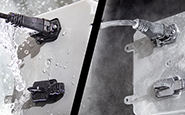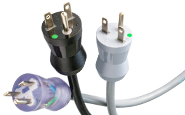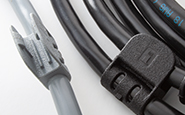Exporting to the Middle East
Exporting power system components worldwide is feasible, but careful research of the country’s export regulations is needed in order to be successful.
Once the decision has been made to export worldwide, it is essential to know the specific country’s export rules and regulations. “To sell globally you must address the following: Mains plug patterns, mains voltages, mains frequencies, and national regulations,” according to Bob Wersen, President of Interpower®.
- Mains plug patterns—Each country has its own type of plug. “Most countries’ electrical regulations require that equipment shipped into the country comes with the cord and plug appropriate for that country,” Mr. Wersen explained.
- Mains voltages—Global mains voltages range from 100–250V. A guide of the mains voltages for the world’s countries can be found at www.interpower.com/ic/guide.html.
- Mains frequencies—The frequencies are measured at 50 or 60Hz. For more information, check out www.interpower.com/ic/designers/designing-for-export.html.
- National regulations—It’s important to follow safety standards. “All of the world’s developed countries and many of the developing countries have electrical safety standards and most have electrical safety test agencies,” Mr. Wersen said. “Most developed countries require some sort of third party test and approval of equipment sold in the country.” Some countries have environmental restrictions on all substances contained in equipment sold in their country, as well as EMC regulations that require third party testing.
Along with the above mentioned considerations, Mr. Wersen also mentioned several other reasons for compliance to international regulations. These include:
- Enhanced quality and reliability of the product;
- Meeting your competition head on;
- Peace of mind in knowing that you sell a product that is not only safe but one that conforms to international expectations for safety.
Exporting to the Middle East
Exporting to Middle East countries can present exciting challenges and rewards. Each one has its own unique requirements and it is vital to know what the export rules are for each country.
Exporting to the Kingdom of Saudi Arabia
With the Kingdom of Saudi Arabia as the largest economy in the Arab world, there are a number of benefits for businesses to export there. However, it needs to be noted that as the market for imports in Saudi Arabia is increasing, the MoCI (Ministry of Commerce and Industry) in that country has established specific regulations for exporters to follow.
If you are interested in exporting to the Kingdom of Saudi Arabia, you will need to follow the CAP (Conformity Assessment Programme). This program was implemented by the MoCI to make sure that products coming into the country meet their mandatory requirements. The CAP can also help to reduce losses to those wanting to import into the country from having to re-export products that do not comply with Saudi requirements.
The CAP is mandatory for all goods being imported into Saudi Arabia, except for medical equipment, medical products, food, and military-related products. To start the process of obtaining CAP approval, contact the local Intertek Saudi Country Office or the UK Trade and Investment team in Saudi Arabia. The costs and time it will take depends on the product.
Every imported product must be accompanied by a CoC (Certificate of Conformity) from an authorized inspection agency. This will allow clearance through Saudi Customs. A CoC is a necessary document that many countries require when exporting in order to clear customs of select countries. The CoC shows that regulations and standards are being met for the country’s import/export guidelines. This includes submitting certain documents before receiving certification. These include: a certification form, a commercial invoice, and a test report proving compliance with the standards. For more information on how to obtain a CoC, visit www.export2saudi.com or www.gov.uk.
Electrical/electronic products, such as plugs and sockets, are considered “high risk products.” This means there is a specific process to follow to become certified: pre-shipment inspection, pre-shipment testing of the product, and sealing of full container load containers. Test reports, the shipment invoice, the inspection report, and the CoC need to be submitted electronically to the Saudi Arabia customs, as well a hard copy of the CoC. For the “Detailed Exporter Guidelines,” visit the Resource Center at www.export2saudi.com.
All imported products must have a non-removable mark of origin. Those that don’t will be stopped by Saudi Customs and corrective action can be taken. For more details, visit www.intertek.com or www.chamber-international.com.
Saudi Arabia is a part of the GCC (Gulf Cooperation Council) which also includes Bahrain, Kuwait, Oman, Qatar, and the United Arab Emirates. Saudi Arabia has free trade agreements with the Greater Arab Free Trade Area, the European Free Trade Association, and Singapore.
In Saudi Arabia, the voltage used is 127/220V with 60Hz. The most frequently specified plug pattern is the United Kingdom plug.
Sources:
www.export2saudi.com
www.intertek.com
www.gov.uk
www.chamber-international.com
www.saso.gov.sa/en
Exporting to Kuwait
There is an emerging export market to Kuwait, but there are certain requirements to follow, so it’s important to know these in advance.
Companies wishing to do business in Kuwait should find a Kuwaiti agent—someone who is able to keep in contact with customers, seek business, and provide market information, as well as maintaining personal communication. It is recommended to complete as much market research and planning in advance as possible. For assistance, check out these websites: www.e.gov.kw or http://www.kuwaitchamber.org.kw.
You can also check with your local Intertek country office or UK Trade and Investment.
The Public Authority for Industry of the State of Kuwait has issued certain requirements in regards to products being imported into the country. These guidelines are called the KUCAS (Kuwait Conformity Assurance Scheme). The KUCAS is in place to ensure that regulated products coming into the country meet the mandatory requirements. Those products require a certificate that will allow clearance through Kuwait Customs. The KUCAS can also help to reduce losses to those wanting to import into the country from having to re-export products not found to comply with Kuwait’s requirements. Inspection rules may change so it's important to check the requirements before exporting. For detailed information on what is involved in exporting to Kuwait, visit
www.exports2kuwait.com, www.intertek.com, www.gov.uk, and www.sgs.com.
Kuwait is a part of the GCC (Gulf Cooperation Council) which also includes Bahrain, Oman, Qatar, Saudi Arabia, and the United Arab Emirates. Kuwait is a member of the World Trade Organization and the World Intellectual Property Organization.
In Kuwait, the voltage used is 230V with 50Hz. The most frequently specified plug pattern is the United Kingdom plug.
Sources:
www.e.gov.kw
www.exports2kuwait.com
www.gov.uk
www.intertek.com
Exporting to Israel
There are many business opportunities for those wanting to export to Israel. There is a diverse market for a wide range of products.
A company should appoint a local agent, rather than selling direct. It’s important to seek legal and tax advice when doing business in Israel. It is recommended to review the Israel Agents Law.
The Standards Institution of Israel (SII) is the national standards body for Israel. The SII is responsible for the testing of domestic and imported products for compliance according to Israeli standards.
For information on exporting to Israel, including market opportunities, business customs, standards and regulations, see www.sii.org.il, www.export.gov/israel and www.gov.uk.
There is also “Information for Foreign Businesses” with Israel on this website: www.moital.gov.il.
Israel is a member of the World Trade Organization and the Organization for Economic Co-operation and Development. It has free trade agreements with the European Union, the European Free Trade Association, and the United States.
In Israel, the voltage used is 230V with 50Hz. The most frequently specified plug pattern is the Israeli plug.
Sources:
www.sii.org.il
www.export.gov/israel
www.moital.gov.il
www.gov.uk
Exporting to Qatar
Qatar has been experiencing economic growth and is reported to have the third largest economy in the Gulf Cooperation Council, after Saudi Arabia and the United Arab Emirates. While there are many business opportunities, Qatar has issued strict regulations for certain products entering the country.
Companies are advised to seek legal and tax advice before starting any type of business partnership. Registration is required by the Ministry of Economy and Commerce to obtain an import license. The Qatar Customs and Ports General Authority is responsible for customs. Registration in the Importers Register and approval by the Qatar Chamber of Commerce and Industry are required. For more information, see www.mbt.gov.qa and www.gov.uk.
Trading requirements with Qatar include products having a CoC (Certificate of Conformity). The CoC lets Qatari authorities know that the products pass technical regulations and approved standards. For more details, visit www.intertek.com.
Qatar is a part of the GCC (Gulf Cooperation Council) which also includes Bahrain, Kuwait, Oman, Saudi Arabia, and the United Arab Emirates. Free trade agreements are with the Greater Arab Free Trade Area and the European Free Trade Area. Qatar is a member of the World Intellectual Property Organization.
In Qatar, the voltage used is 240V with 50Hz. The most frequently specified plug pattern is the United Kingdom plug.
Sources:
www.mbt.gov.qa
www.intertek.com
www.gov.uk
Exporting to the United Arab Emirates
Regarded as a regional hub for companies doing business throughout the Middle East, the UAE (United Arab Emirates) has many business opportunities.
The UAE is a constitutional federation which was established in 1971. It consists of the following seven emirates: Abu Dhabi, Dubai, Sharjah, Ajman, Umm Al Qaiwain, Ras Al Khaimah, and Fujairah.
There are a number of aspects to consider in order to do business in the UAE. For example, an international company needs to have an UAE national sponsor, agent, or distributor. Per the Dubai Customs website, export procedures include submitting required documents, paying the export fees, and receiving a customs declaration. There are specific documents required. For more details, see www.dubai.ae/en.
While there is a common customs law among the seven emirates, each member state also has its own list of prohibited, restricted, and exempted products. There are also packaging and labeling requirements. For more specific details, check out the following websites: www.dubaicustoms.gov.ae/en, www.dubai.ae/en, www.export.gov/unitedarabemirates, and www.gov.uk.
United Arab Emirates is a part of the GCC (Gulf Cooperation Council) which also includes Bahrain, Kuwait, Oman, Qatar, and Saudi Arabia. Free trade agreements are with the Greater Arab Free Trade Area a nd the European Free Trade Area.
In the United Arab Emirates, the voltage used is 220V with 50Hz. The most frequently specified plug pattern is the United Kingdom plug.
Sources:
www.dedc.gov.ae/en
www.dubai.ae/en
www.dubaicustoms.gov.ae/en
www.export.gov/unitedarabemirates
www.gov.uk
Exporting to the Hashemite Kingdom of Jordan
There are a variety of economic opportunities available for international companies interested in doing business with the Hashemite Kingdom of Jordan.
To enter the market in Jordan, it is best to work with a local agent, distributor, or partner. It’s important to understand the Jordanian market and what’s involved in doing business in Jordan, including specific import requirements and documentation.
The Jordan Enterprise Development Corporation offers a range of services and information for international companies looking for suppliers and business partners in Jordan. To find out more, check their website: http://www.jedco.gov.jo/.
The Jordan Standards and Metrology Organization is responsible for issuing, approving, reviewing and monitoring the implementation of standards and regulations regarding goods, products, and services in the country. It is also responsible for granting of conformity certificates, including the Quality Mark. For more information, see www.jsmo.gov.jo.
Jordan has a foreign trade policy based on economic openness per www.mit.gov.jo. For more details on exporting, see www.export.gov/Jordan and www.gov.uk.
Jordan is a member of the Greater Arab Free Trade Area, has entered into an association agreement with the European Union, and has signed free trade agreements with the United States, European Free Trade Association, and Singapore. Jordan is also a member of the World Trade Organization.
In Jordan, the voltage used is 230V with 50Hz. Since there are several different plug patterns available within the country, it is recommended to contact the Jordanian customer to see which plug type is being used.
Sources:
www.jedco.gov.jo/joomla
www.mit.gov.jo
www.jsmo.gov.jo
www.export.gov/jordan
www.gov.uk
Exporting to the Sultanate of Oman
There are many aspects to consider when doing business in the Sultanate of Oman. It’s important to know in advance what the export regulations are for this country.
Companies are advised to do as much market research and planning as possible. Finding a local agent will assist in learning the Omani customs and culture. It’s important to know what the import controls are, what the labeling and packaging regulations are, and what’s involved in actually having a business presence in Oman. For further exploration, see www.export.gov/oman and www.gov.uk.
Within Oman there is a Ministry of Commerce and Industry. Responsibilities include regulating import and export procedures and granting licenses. For more details, see www.oman.om. Another source for information is: www.ithraa.om.
There is also an Oman Chamber of Commerce to help with inquiries and give economic advice. The chamber can provide advice on activating businesses and promotion of products. For more information on the chamber, visit https://chamberoman.om/.
For more information on regulations in Oman, check out the Royal Oman Police website: www.rop.gov.om.
Oman is a part of the GCC (Gulf Cooperation Council) which also includes Bahrain, Kuwait, Qatar, Saudi Arabia, and the United Arab Emirates. Oman is a member of the World Trade Organization and the World Intellectual Property Organization.
In Oman, the voltage used is 240V with 50Hz. The most frequently specified plug pattern is the United Kingdom plug.
Sources:
www.oman.om
www.ithraa.om
www.chamberoman.com
www.rop.gov.om
www.export.gov/oman
www.gov.uk
Exporting to the Kingdom of Bahrain
In recent years there have been increasing trade opportunities with the Kingdom of Bahrain, located on a small island off the coast of Saudi Arabia, next to Qatar in the Persian Gulf.
There are various aspects to doing business in Bahrain. An actual presence in Bahrain is an advantage. It is suggested to choose a local partner who can help with business matters, such as advertising, due to differences in culture and language. For more information on starting a business in Bahrain, visit the Bahrain Economic Development Board’s website: www.bahrainedb.com.
Bahrain has specific customs procedures that need to be followed. There are customs regulations to follow and specific documents required to submit. Among the necessary documents are the Certificate of Origin and an Import Customs Declaration Form. There is also an import customs clearance procedure. For more details, see the Kingdom of Bahrain Ministry of Interior Customs Affairs website at www.customs.gov.bh.
For more information on exporting to Bahrain, visit www.moic.gov.bh, www.export.gov/middleeast, and www.gov.uk.
Bahrain is a part of the GCC (Gulf Cooperation Council) which also includes Kuwait, Oman, Qatar, Saudi Arabia, and the United Arab Emirates. Bahrain has a free trade agreement with the United States.
In Bahrain, the voltage used is 230/240V with 50Hz. The most frequently specified plug pattern is the United Kingdom plug.
Sources:
www.moic.gov.bh
www.customs.gov.bh
www.bahrainedb.com
www.export.gov/middleeast
www.gov.uk
Exporting to Egypt
With careful market research, the country of Egypt has the potential to be one of the emerging markets in the Middle East.
There are a number of aspects to consider when starting. A local representative or partner is needed to do business in Egypt. It’s also important to know the rules and regulations before exporting to Egypt. For details, see www.export.gov/Egypt and www.gov.uk.
The Customs Department is part of the Ministry of Finance. Part of its purpose is to control the movement of goods imported into the country. To learn more about Egyptian customs, check www.customs.gov.eg.
There are certain restrictions in order to do business in Egypt. To learn more about the trade laws within the country, see the General Authority for Investment trade laws at https://gafi.gov.eg/English/Pages/default.aspx. Another resource is the website for the General Organization for Export and Import Control at www.goeic.gov.eg/en.
Egypt has free trade agreements with the Greater Arab Free Trade Area and the Common Market for Eastern and Southern Africa. It has trade partnerships with the EU and with EFTA (Iceland, Liechtenstein, Norway, and Switzerland). Egypt is a member of the World Trade Organization.
In Egypt, the voltage used is 220V with 50Hz. The most frequently specified plug pattern is the Continental European plug.
Sources:
www.export.gov/Egypt
www.gov.uk
www.customs.gov.eg
www.gafi.gov.eg/EN
www.goeic.gov.eg/en
Exporting to other Middle East countries
Iran, Iraq, Syria, Palestine, and Yemen are not included in this paper due to several countries, including the United States, having trade embargoes or other sanctions which does not allow for trade with these countries at this time. If you are concerned about the country you are in, please check with your local government agency.
Conclusion
Doing business in a global market is possible and accessible and offers excellent business opportunities, but those wanting to export to different countries, such as those in the Middle East, need to be knowledgeable in the desired country’s import/export requirements.





